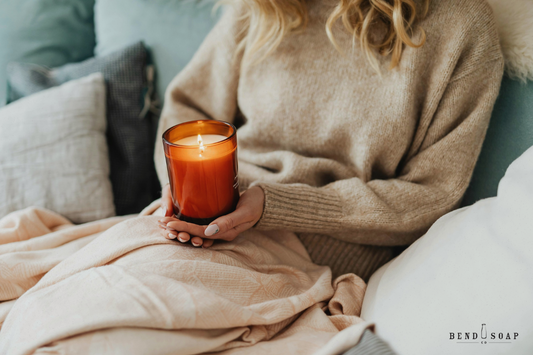Are you making a spring cleaning checklist and checking it twice? This time of year is all about starting fresh, which often involves deep-cleaning baseboards and decluttering junk drawers. But what about all the not-so-great stuff that can’t be cleaned or cleared away?
Today, we’re dishing out some simple swaps for a healthier home and a true refresh. From the plastic containers you store leftovers in to the dish soap you use daily, your kitchen is full of items that seem harmless—but might be doing more harm than good.
If you’ve been itching for a healthier, less toxic home, this post is for you. Ready to refresh your space in the most satisfying way? Here are 5 non-toxic kitchen swaps to add to your spring cleaning checklist this year.
Why Switch to Non-Toxic?
Your kitchen is the heart of your home. It’s where you prepare meals, laugh with your children, and spend more time than you’d probably like cleaning up messes. That’s why it’s so important to think about the products you're using in this space every day.
Many conventional kitchen products are made with hormone-disrupting chemicals, artificial fragrances, harsh preservatives, and materials that break down into microplastics or leach toxins into your food and water. No, thank you!
Don’t worry, you don’t have to throw everything out or become a DIY mastermind overnight. Simple swaps can make a big difference, especially in high-use areas like your kitchen. If you’re ready for a kitchen ditch-and-switch, we’ve got you covered.
Welcome to spring cleaning—the crunchy way.
5 Non-Toxic Kitchen Swaps for Your Spring Cleaning Checklist
 The idea of switching to “non-toxic living” can feel intimidating, but it’s not an overnight thing. It’s a lifestyle that you can embrace one swap at a time, and we’re here to help make it more practical and less overwhelming.
The idea of switching to “non-toxic living” can feel intimidating, but it’s not an overnight thing. It’s a lifestyle that you can embrace one swap at a time, and we’re here to help make it more practical and less overwhelming.
Whether you’re all in on the crunchy lifestyle or just getting started, these are the non-toxic kitchen swaps we’re loving this spring.
1. Ditch Plastic Containers for Glass
Plastic containers are cheap, easy, and stack wonderfully—we get it. But they also come with hidden risks. When heated (even in warm water), plastic can leach chemicals like BPA or phthalates into your food, especially if the container is scratched or old.
That’s why we prefer glass containers for storing food. They’re non-toxic, microwave-safe, and way more durable. They won’t warp in the dishwasher and they’re perfect for storing leftovers, prepping lunches, and keeping pantry staples fresh.
You can even repurpose glass jars from pasta sauce or nut butters for an added sustainability win!
2. Swap Unfiltered Water for Filtered Water
Many people drink water straight from the tap, assuming it’s clean enough. The truth is, most municipal water sources contain trace amounts of chemicals, heavy metals, and microplastics.
Installing a basic water filter (think pitcher, countertop, or under-the-sink) is one of the easiest and most effective ways to reduce unwanted toxins from your drinking and cooking water.
It’s a simple, affordable investment in your health that pays off with every sip. No need to splurge on a top-tier filtration system right away—just choose the option that works for you.
3. Trade Plastic Cutting Boards for Wood
Plastic cutting boards might seem convenient, but they can trap bacteria in grooves and shed tiny plastic particles over time. That’s not exactly what you want near your food.
Switching to a wooden cutting board (like maple or bamboo) is a cleaner, safer, and more eco-friendly alternative. Wood is naturally antimicrobial and easier on your knives, too.
All you have to do is oil it regularly and it’ll last for years. Not to mention, it looks great on a countertop.
4. Say Goodbye to Chemical Dish Soap & Use All Shield Instead
This might be our favorite non-toxic kitchen swap, and not just because it smells amazing. Most commercial dish soaps are packed with synthetic fragrances, sulfates, and preservatives that dry out your skin and leave behind residue on your dishes.
All Shield Goat Milk Soap is made with simple, nourishing ingredients that are tough on grease but gentle enough for your hands. It’s crafted with a blend of essential oils that are naturally antibacterial—like clove, cinnamon, and eucalyptus.
When you wash dishes every day like so many of us do, you deserve dish soap that won’t strip away moisture or cause irritation. Use All Shield to lather a dish brush or sponge, or rub it directly on messy pots and pans. It's versatile, effective, and Bend Soap-approved.

5. Switch From Aluminum Foil to Unbleached Parchment Paper
Aluminum foil is a kitchen staple for many of us, but when it’s used to cook acidic or salty foods (like tomatoes or lemon), small amounts of aluminum can leach into your food.
Unbleached parchment paper is a non-toxic, compostable alternative that’s great for baking, roasting, and wrapping up leftovers. Look for brands that are chlorine-free and coated with silicone instead of plastic. Once you make the switch, you won’t go back.
Overwhelmed? Start With One Non-Toxic Kitchen Swap
If this feels like a lot to add to your spring cleaning checklist, just pick one for now. Swapping out a single product for a cleaner option is more powerful than you think.
Why? Because it builds momentum and reduces your exposure to toxins in small, meaningful ways that add up.
When you choose wholesome products with ingredients you can actually pronounce (we’re looking at you, store-bought dish soap), you’re taking a big step towards non-toxic living.
That’s good for your health, good for your family’s well-being, and good for the planet. And you’re doing it all right from your kitchen!
FAQs About Non-Toxic Kitchen Swaps
Do I Need to Toss Everything Out and Start Over?
Not at all! The goal is progress, not perfection. Start by replacing things as they run out or wear out. That way, your swaps feel natural and budget-friendly instead of stressful.
Are Products Labeled “Green” Or “Eco” Always Non-Toxic?
Unfortunately, no. Many companies use “greenwashing” to make their products look clean when they’re actually not. Always read the ingredient list and look for products free from synthetic fragrance, dyes, and harsh preservatives.
How Can I Tell if a Product is Truly Non-Toxic?
Look for short ingredient lists, recognizable ingredients, and certifications like EWG Verified or MADE SAFE. When in doubt, less is more—especially when it comes to skincare, cleaning, and food storage.
Is All Shield Soap Really Effective for Dishwashing?
Yes! All Shield Goat Milk Soap is made with fresh goat’s milk, coconut oil, olive oil, sustainable palm oil, and essential oils with strong antibacterial properties. It’s great for cutting through grease while nourishing your skin, unlike other dish soaps that dry out your skin.
Spring Clean Your Way to a Kitchen Glow-Up
If you’ve been looking for a sign to make a real change in your home, this is it. It’s time to give your kitchen the refresh it deserves. These non-toxic kitchen swaps are simple, practical, and designed to make your spring cleaning actually feel like a clean start.
Whether you’re saying goodbye to that so-green-it’s-practically-glowing dish soap or replacing plastic containers, you're taking a big step towards non-toxic living.
If you’re not sure where to begin, we recommend starting with a swap you use daily. For many of us, that’s dish soap. Our All Shield Goat Milk Soap is a multitasking powerhouse that makes a perfect spring cleaning swap. It’s non-toxic, naturally antibacterial, gentle on hardworking hands, and great for tackling grease and grime.
Have a kitchen swap you love? Drop it in the comments — we’d love to hear about it!




